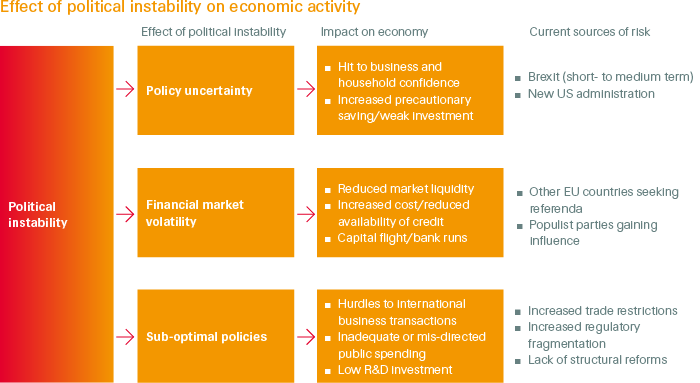How does political instability affect the re/insurance industry?
Political instability has the potential to undermine economic growth and derail the projected modest global recovery. Increased anti-globalisation sentiment and immigration issues bolstered the Brexit vote and boosted support for populist politicians like Donald Trump in the US and Marine Le Pen in France. In addition, ongoing geopolitical tensions around the world, most notably in Ukraine, the Middle East and parts of Southeast Asia, are a serious impediment to economic growth. These developments are likely to continue to shape the political risk environment next year.
While it is hard to gauge the likelihood of different political risks materialising, it is nevertheless useful to frame possible economic outcomes of relevance for the re/insurance industry. Aside from the obvious impact associated with military conflict and civil unrest, the political environment can adversely influence the economic outlook three ways: heightened policy uncertainty, increased financial market volatility and sub-optimal economic policies (see figure). Each of these has the potential to reinforce the others. The first two are likely to impact aggregate demand in the short term, and the third could undermine long-run productive potential.
Over the short term, re/insurers will be mostly affected on the asset side in a scenario of heightened financial market volatility. In addition, slower growth may dampen the outlook for re/insurersʼ premium growth. It is hard to quantify the economic impact of political instability, although the economic downturn is likely to be less severe as a result of policy uncertainty alone compared to a scenario which also involves financial market volatility. Beyond the short term, re/insurers are likely to suffer most if political instability results in policies that complicate or hamper international business transactions, such as increased regulatory fragmentation or capital restrictions.

Source: Swiss Re Economic Research & Consulting